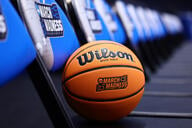You have /5 articles left.
Sign up for a free account or log in.
GRAPEVINE, Texas -- A three-person panel here on Wednesday afternoon painted a disconcerting picture of the financial model supporting collegiate athletic programs, arguing that the system is unsustainable and detrimental to the academic pursuits of the athletes who generate tens of millions of dollars for their institutions and conferences.
Here's hoping they got the message out, because they're not going to have another chance -- at least not under the umbrella (and on the dime) of one of their primary targets, the National Collegiate Athletic Association.
The NCAA told them and others Monday night that the association has defunded the Scholarly Colloquium that for six years provided a space for (often critical) academic discourse at the association's annual convention. NCAA officials said the colloquium's low attendance and its accompanying academic journal's failure to generate revenue were at the root of the decision, but the scholars who run the two-day event suspect foul play.
It's not the first time in the colloquium's six-year run that its organizers have clashed with NCAA leaders. After the NCAA postponed the colloquium's creation in 2006 and then selected presenters itself in 2008, some suggested the NCAA didn't want to give a platform -- or, at least, a highly visible one -- to scholarship that framed the association in a bad light.
"The NCAA's stated decision to redirect the funding to targeted research that would serve the NCAA's express agenda serves as a pretext for the exception NCAA officials have taken to the critical examination of the college sport enterprise," the board of the Forum for the Scholarly Study of Intercollegiate Athletics, which runs the colloquium and journal, said in a statement. "This action points to the disconnect that exists between the NCAA and the mission of higher education by striking at the very heart of the academy."
Jim Isch, NCAA chief operating officer, said in a statement Wednesday night that the colloquium "has not developed in the way we hoped." The Journal of Intercollegiate Sport has narrow distribution (the NCAA buys 90 percent of copies to distribute to faculty athletics representatives) and isn't often cited in other works. Only 50 people registered for this year's colloquium, he said, "many of whom were presenters or board members."
In piloting the colloquium in 2008, "The goal was to develop an environment that would foster new ideas and new scholarship to help inform future policy related to higher education and college athletics," Isch said. "Unfortunately, the colloquium has not met this goal."
In their presentations Wednesday afternoon, the speakers were indeed critical, both of the NCAA and the college presidents who run it.
"See no evil, hear no evil, speak no evil may be the approach the NCAA wants to take with research of intercollegiate athletics," said Jason Lanter, an associate professor of psychology at Kutztown University of Pennsylvania who researches the intersection of sport and society. "I am confident this is not the approach we will take. After all, education is about asking questions.... even if we don't like what the evidence shows."
Among the topics Lanter and others raised Wednesday: Do students and athletes know and/or care that they're subsidizing the athletic endeavor? Why do black athletes make up the majority of starters in the revenue-generating sports of football and men's basketball, yet graduate at lower rates than their white teammates? Why has athletic spending continued to shoot upward even as the economic recession has crippled institutional financing? Are colleges really putting students' education first when they're admitting athletes who don't meet admissions standards, jumping conferences to get better media coverage, and requiring athletes to maintain full course loads but also work around time-consuming sports schedules?
Lanter invoked the tagline that's plastered on banners throughout this convention center just outside Dallas, and which will ring a bell for anyone who's spent any time watching college sports: "There are 400,000 NCAA student-athletes, and almost all of them will go pro in something other than sports."
"Am I the only one who cringes when I hear that commercial?" Lanter asked. "If they are going pro in something other than sports -- the vast majority of them -- then their priority in college should be that something else. But that isn't happening."
In their statement regarding the forum's defunding, the board members quoted Wally Renfro, senior vice president for public policy at the NCAA, as telling The Chronicle of Higher Education, "I was hearing virtually one voice being sung by a number of people, and it was relatively critical of the NCAA's academic reform effort.... If you lose the capacity for this platform to be a dialogue, it isn't a colloquium anymore. Some might call it a rant."
But it's not a rant if the scholars also suggest potential solutions to the problems they identify, they said, offering up a few: Multiyear scholarships. Higher admission standards. Lighter courseloads, and more years to complete a degree. Mainstreaming into the general student body -- not putting athletes in an academic and social bubble from the first day they set foot on campus.
They were less clear on how to fix the economic model, which in strict business terms, is clearly failing, they said. Only 20 or so athletic programs actually make money without relying on subsidies, either from students or their institutions. Colleges hopping conferences in hopes of making millions are only hurting students more, they said (and not just the athletes who have to travel farther for competition and are under more pressure than ever to perform, but also the non-athletes whose campuses are disrupted with media intrusion, campus closures and the like).
According to a Delta Cost Project report released Wednesday, the amount of spending per athlete grew by 50 percent from 2005-10, with per-athlete athletics spending at reaching three to six times that of academic spending per non-athlete. In a study he presented Tuesday, should this be wednesday, or was this presented before you got there? dl *** before I got here. -ag John Dunn, president of Western Michigan University, said median spending on Southeastern Conference athletes totaled nearly $164,000 per athlete in 2010, more than 12 times the amount colleges in that conference spent on academics per student (about $13,400). The NCAA made $860 million in fiscal year 2012, Lanter noted. Athletic conferences made $180 million from this season's football bowl games alone.
Could any of this money be redirected toward academic pursuits, convention attendees asked? Possibly, but that's not really a discussion that's taking place.
In the end, the responsibility lies with the college presidents who run the association, said Jeff Orleans, a former executive director of the Ivy League Conference and now a consultant with Alden & Associates. The Division I governance system places all the power with 18 college presidents who make up the Division I Board of Directors, with influence weighted toward the wealthier Bowl Championship Series institutions.
"There is no NCAA -- there is a set of college presidents," Orleans said. "They are in full control of college athletics finances. The buck -- or in this case, many bucks -- stops and stays with them."
All three speakers came at the issue from different angles, but ultimately, their arguments centered on improving the educational experience for athletes -- something NCAA bylaws and rhetoric suggest is the first priority.
The NCAA's bedrock principle, amateurism, is supposed to protect the integrity of athletes' educational experience by forbidding them to partake in any commercial activities (such as sponsorships or sales of jerseys and memorabilia). But there's an inherent contradiction, said Billy Hawkins, an associate professor of kinesiology at the University of Georgia.
"Having a system that is capitalist and egalitarian was overlooked," Hawkins said. "The problem is not generating revenue, it is spending and the direction of that spending."
Ellen J. Staurowsky, a professor of sport management at Drexel University and organizer of this year's Scholarly Colloquium, said she's hopeful that the forum will find some recourse to get back on track. Despite the NCAA's claim that only 40 people registered for the colloquium, attendance each year reaches into the hundreds, and several people this year have said they plan to write the association and push for the forum's reinstatement.
"The structure itself is not designed to be profit-making," Staurowsky said in an interview Wednesday. "There may be avenues to reverse this."




